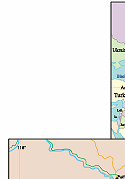 |
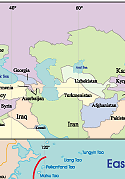 |
 |
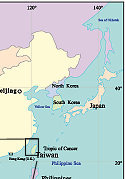 |
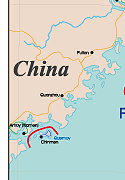 |
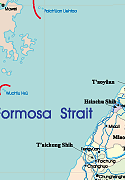 |
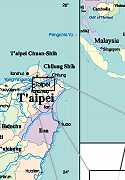 |
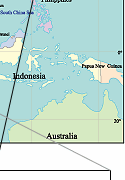 |
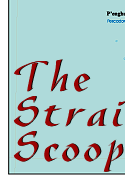 |
 |
 |
 |
|
September 10, 1999 TAIWAN INDEPENDENCE AND THE STOCKHOLM SYNDROMEQuestion: What is the real reason the Taiwan independence elite refuses to be reunited with China? A. Because the Taiwan independence elite are “Native Taiwanese” who were colonized in 1949 by “Han Chinese” the way Australia and New Zealand were colonized by the British. B. Because although the Taiwan independence elite are themselves Chinese, they are like America’s Founding Fathers, and prefer death to colonial oppression. C. Because the Taiwan independence elite are principled champions of free market capitalism, and reunification would mean they would have to live under socialism. D. Because the Taiwan independence elite are victim/victimizers in a still unresolved “Stockholm Syndrome” identity crisis with its roots in a half century of humiliating Japanese colonialism. If you answered A, B, or C, go to the back of the class. |
|
Bevin
Chu is an American architect of Chinese descent registered to practice
in Texas. Currently living and working in Taiwan, Chu is the son
of a retired high-ranking diplomat with the ROC (Taiwan) government.
His column, "The Strait Scoop," now appears Fridays at
Antiwar.com. Archived Columns Taiwan
Independence and the Stockholm Syndrome Taiwan Independence and Free Lunches (8/31/99) |
|
If you answered D, you should be writing this article, not me, for you already understand the underlying social psychology of Taiwanese separatism, better even than the Taiwan “independence” leaders themselves. Let’s look at the answers. A. Because the Taiwan independence elite are “Native Taiwanese” who were colonized in 1949 by “Han Chinese” the way Australia and New Zealand were colonized by the British. WRONG. Taiwan separatist leaders fraudulently label themselves as “Native Taiwanese.” They are not. They are Chinese. Most are from Fujian province a mere 100 miles to the east. A minority are from Guangdong province slightly further south. Taiwanese is not a language, merely a regional dialect of Chinese. It is not even native to Taiwan, but originates in the Ming Nan (“South of the Ming River”) region of Fujian. The REAL “Native Taiwanese” are Aborigines related to New Zealand’s Maori, who migrated to Taiwan in prehistoric times, and whom early Chinese settlers drove into the mountains. Taiwan independence is not an aboriginal rights movement and should not be confused with the Hawaiian independence or American Indian movements. B. Because although the Taiwan independence elite are themselves Chinese, they are like America’s Founding Fathers, and prefer death to colonial oppression. WRONG. The American Revolution was motivated by political idealism. It was a radical republican rejection of a monarch’s economic exploitation of a colonial population. (“No taxation without representation.”) Americans of British descent who no longer considered themselves British were not ashamed of or rejecting their ethnic and cultural roots, they were inventing a revolutionary new political and economic paradigm which necessitated the severing of political ties with an obsolete form of governance. Taiwan “independence” on the other hand is not about anything remotely so elevated. Quite the opposite. Far from rejecting colonialism, Taiwan “independence” is about nostalgia for Japanese colonial rule by Chinese collaborators with inferiority complexes who prefer to be something they are not, Japanese, rather than what they are, Chinese. It is about the neurotic need of an “elite” ruling class of Chinese Quislings to deny their ethnic and cultural identity (“We don’t want to be Chinese”). To understand the mindset of the Taiwan independence elite, try to imagine Jewish victims of the Shoah as militant Holocaust deniers. Mind-boggling, I know, but truth is often stranger than fiction. Merely one example: on orders from Lee Teng-hui, the ROC Ministry of Education is busily engaged in Orwellian historical revisionism, rewriting K-12 textbooks to echo textbooks in Japan, which whitewash WWII Japanese war crimes while blaming China and other victims of Japanese militarism. C. Because the Taiwan independence elite are principled champions of free market capitalism, and reunification would mean they would have to live under socialism. WRONG. When it looked as if communism was gaining the upper hand, Lee joined the Taiwan Communist Party. Lee’s Communist Party membership papers have been made public on TV talk shows both here in Taipei and in Beijing. The irony is that if Lee had not been the craven opportunist he is, he would not even be alive today to occupy the office of ROC President. When the political winds abruptly shifted, Lee saved his own miserable hide by ratting out the poor saps he himself recruited, who were executed by firing squad. The shrilly pro-independence Democratic Progressive Party (DPP) meanwhile, is exactly what it sounds like, a left wing, populist, democratic socialist party. Its rabid anti-business animus recently forced Germany’s Bayer corporation to pull out of Taiwan in disgust after years of fruitless negotiations and millions in squandered preliminary groundwork for a proposed pharmaceutical plant in DPP controlled Taichung. Staunch anti-Communist Chiang Kai-shek was responsible for Taiwan’s universally acknowledged and justly praised “economic miracle.” His economic advisors, implementing the same kind of economic strategies Ludwig Erhard used to breath life back into a West Germany leveled by Allied bombing, transformed an impoverished, exploited Japanese colony into one of the four “Asian Tigers.” His son and successor Chiang Ching-kuo was responsible for Taiwan’s democratization. The younger Chiang rescinded martial law, legalized opposition political parties, and aggressively promoted Ming Nan, Hakka and Aboriginal Taiwanese into positions of authority. Lee Teng-hui, on the other hand, contrary to what his high-priced Madison Avenue image consultants have bamboozled the western media into believing, contributed nothing to Taiwan’s economic and political evolution. Soon after mentor Chiang Ching-kuo’s death, Lee betrayed Chiang’s tragically misplaced trust by turning Taiwan into a nightmare version of “Asian crony capitalism.” Lee Teng-hui is nothing less than Taiwan’s answer to Ferdinand Marcos. His wife Tseng Wen-hui’s shopping expeditions to Japan are legendary, and put Imelda to shame. Lee’s sole “democratic reform” was to change presidential elections from indirect election by an American style Electoral College to direct election by the general public. Whatever benefits may have accrued from this procedural change have been offset negatively many times over by Lee’s shredding of the ROC Constitution, Lee’s undermining of Taiwan’s still shaky commitment to the Rule of Law, and Lee’s flinging the doors of government offices wide open to organized crime. According to Liao Cheng-hao, former Minister of Justice who resigned last year in disgust, thirty percent of Lee Teng-hui’s KMT legislators have triad (mob) connections. Is Beijing dying to impose communism on either Hongkong, Macao, or Taiwan? Are you kidding? Just ask any diehard Marxists in the west what they think of the current regime in Beijing. They’ll sputter with apoplexy that contemptible “Capitalist Roaders” like radical reformer Zhu Rongi have sold socialism down the river! Beijing today doesn’t even want socialism for the mainland, let alone for Hongkong, Macao, or Taiwan. It should be abundantly clear by now that answers A through C are NOT the real reason the Taiwan independence elite refuse to be reunited with China. This leaves D. Because the Taiwan independence elite are victim/victimizers in a still unresolved “Stockholm Syndrome” identity crisis with its roots in a half century of humiliating Japanese colonialism. CORRECT. Go to the head of the class! The Taiwan “independence” movement’s real reason for not wanting to be reunited with China has nothing to do with ritual lip service the Taiwan independence elite mechanically pay to freedom, democracy, or capitalism, but rather with something about which they are in massive denial. It is seldom dealt with honestly even here in Taiwan, and never abroad. Taiwan independence is the Taiwan separatist elites’ collective struggle with a variant of the Stockholm Syndrome—a fawning, masochistic Japanophilia. Taiwan independence is the lingering aftereffect of Japan’s soul-degrading 50 year colonial occupation. In 1895 a newly invigorated, militarized Japan attacked a decadent, defenseless Manchu China and extorted from China her offshore province of Taiwan. In a heart-rending scenario straight out of “Sophie’s Choice,” Taiwan Chinese learned their own government had sacrificed them, albeit at gunpoint. Their feeling of bewilderment and disorientation can only be imagined. This experience prompted an “elite” clique of Quislings on Taiwan to totally identify with their colonial overlords and to deny their Chinese-ness. Better an ersatz Japanese, they reasoned, than a bona fide Chinese. After all, wasn’t it more dignified to be a second class citizen of the invincible Japanese juggernaut, than to be a full-fledged citizen of an enervated China too impotent even to prevent her people from being kidnapped and her territory from being annexed? Everybody loves a champ, nobody loves a chump. Lee Teng-hui was born into a family permeated with this Quisling mindset, what the Japanese colonial government called a “Guoyu Jiating” or “National Language Family,” meaning the family worked for Japan, spoke Japanese, adopted Japanese names, swore allegiance to the Japanese Emperor, and were “politically reliable.” Lee himself has publicly repeated numerous times that before age twenty-two he considered himself Japanese. In a news article entitled “Taiwan President Lee Teng-hui’s Tears,” a Member of Japan’s Parliament after interviewing Lee told the Japan Daily Post, “Lee Teng-hui received a Japanese education during Japanese occupation. His older brother was a soldier in the Japanese Imperial Army and died in action . The result is Lee Teng-hui is in his own heart and in his own eyes even more Japanese than the Japanese. His yearning and homesickness for Japan is intense.” During WWII, each time news reached Taiwan that the Japanese Imperial Army had scored another victory against American and Chinese troops in the Pacific Theater, Lee Teng-hui would on his own initiative, without any external coercion, rally classmates at Tamkiang High School to hold pro- Japan victory marches, with himself leading the procession, jubilantly waving a Japanese flag and shouting “Banzai.” While Taiwan independence Quislings like Lee Teng-hui, Peng Ming-min and others lived lives of luxury and privilege in Kyoto and Tokyo by selling out their fellow Chinese on Taiwan, Taiwanese men who refused to actively collaborate were shipped off to the South Pacific as slave labor constructing military bases or as cannon fodder on the front lines. Taiwanese women were abducted and installed in brothels to serve Japanese soldiers as sex slaves, subjected to year after year of gang rape. In 1987, when Chiang Ching-kuo died, ethnic harmony prevailed on Taiwan. Millions of ordinary citizens, young and old, rich and poor, Ming Nan, Hakka, Aborigine, and post-1949 arrivals from other provinces all turned out for his funeral procession. People wept openly. The depth of their gratitude was profound. The two Chiangs, authoritarian warts and all, had spared the ROC from Mao’s madness and lifted Taiwan’s people out of poverty. Taiwanese peasants formerly ground under the heel of Japanese colonial overlords now drove Mercs and Bimmers. Even animosity dating from the bloody 2-28 Incident of 1947, deliberately incited by diehard Japanese right-wingers who remained behind as Fifth Columnists to sabotage Taiwan’s retrocession, was a thing of the past. Gradual but eventual German style reunification with a post-Maoist, rapidly liberalizing mainland was only a matter of time. Alas, it did not take long for Lee Teng-hui, whom Chiang Ching-kuo made the monumental error of entrusting to carry on his reformist legacy, to betray his mentor, not to mention his Constitutional Oath of Office. Unbeknownst to Chiang, reunification was the last thing on Lee’s mind. (Actually reunification was on Lee’s mind, only with Japan, not with China.) Now that Lee was president, he would see that reunification with China never happened . By the 1996 presidential election, Newsweek’s “Mr. Democracy” was openly inciting Ming Nan Chinese to hate post-1949 arrivals from other provinces, referred to misleadingly as “mainlanders.” (In fact all ethnic Chinese on Taiwan are “mainlanders.” Some arrived earlier, some arrived later. Only the Aborigines, which constitute less than 2% of the population can claim to be “Native Taiwanese.” Their status is akin to that of Polynesians in Hawaii, now America’s 50th state.) With Lee’s encouragement, thuggish Taiwan independence cabbies assaulted bewildered “mainlander” mothers with children in tow, screaming “Chinese pigs, get the hell back to the mainland!” Lee’s coded campaign slogan “Taiwanese vote Taiwanese, mainlanders vote mainlander,” was merely the local component of his larger anti-reunification strategy, which called for provoking enough hatred against “mainlanders” and mainland China that eventual reconciliation would be a political impossibility. Poll numbers routinely cited by separatists to “prove” popular opposition to reunification are Lee Teng-hui and Chen Shui-bian’s payoffs for “1984” style “Two Minutes Hate” campaigns. These orchestrated efforts have yielded blips in populist mob sentiment dutifully archived for future use as separatist propaganda. Respectable scholars and academics repeatedly decry this transparent incitement of irrational hatred on TV talk shows, but the Taiwan independence agitators simply ignore them and redouble their efforts. To the separatists’ chagrin however, and the Taiwan public’s immense credit, more sophisticated voters have more often than not ignored their demagoguery and voted for the best man for the job regardless of provincial origin. Taipei Mayor Ma Ying-jeou’s resounding victory in 1998 over petty tribalist Chen Shui-bian, who played the “ethnicity card” to the hilt, amounted to a defacto rejection of petty ethnic prejudice among Taipei’s more cosmopolitan voters. Taiwan “independence” truly is an oxymoron. The Taiwan independence leaders’ lips flap and ringing affirmations of “independence” issue forth, but the Taiwan independence leaders’ insides are incarcerated in a psychic prison of complete and utter dependency. Dependent materially on the US Navy’s Seventh Fleet for their “independent” political status, and dependent psychologically on Japan for their sense of pseudo self-esteem as ersatz Japanese. The Taiwan independence leadership has made zero effort to come to terms with their unresolved issues through introspection. Instead, they have taken their personal/collective psychological conflict and externalized it as an international political conflict. Their very real emotional pain, which deserves to be dealt with, but on a therapist’s couch or in an encounter group, is instead on the verge of being played out as deadly psychodrama on the battlefield. Famed author, historian and ex-political prisoner Li Ao, the pro- reunification New Party’s long shot presidential candidate, this week publicly exposed KMT presidential candidate Lien Chan’s two sons and son-in-law as draft evaders, granted special exemptions by the Ministry of Defense. Apparently Vice President Lien’s “princelings” lives are too precious to risk on the front lines fighting for the “independence” Lee Teng-hui and his handpicked successor Lien so self-righteously demand for Taiwan. Li Ao also exposed DPP presidential challenger Chen Shui-bian as a draft evader. Chen, a loudmouth Taiwan independence grandstander whose attitude is “Declare independence now! To hell with the consequences!” promptly went on TV, all weepy and teary-eyed, pleading physical disability, which he helpfully demonstrated for the television cameras by bending one elbow outward slightly farther than normal. Whether the Taiwan “independence” leaders ever come to terms with their collective identity crisis is no one’s affair but their own. If the Taiwan independence elite decide they really prefer to be Japanese rather than Chinese, they are free to emigrate to Japan. Their indisputable right to make that choice will be honored. But if they imagine patriotic Chinese on both sides of the Taiwan Straits are going to stand idly by while they take a chunk of sovereign Chinese real estate along with them, they have another think coming. And if the Taiwan separatist elite expect a free lunch paid for with American tax dollars and American blood, then it is time for every sovereign American who values his own life and his own plans for his future, to co-opt a slogan from the Sixties and shout “Hell no! We won’t go!” Please Support Antiwar.comA contribution of $20 or more gets you a copy of Justin Raimondo's Into the Bosnian Quagmire: The Case Against US Intervention in the Balkans, a 60-page booklet packed with the kind of intellectual ammunition you need to fight the lies being put out by this administration and its allies in Congress. Send contributions to Antiwar.com or
Contribute Via our Secure Server |
